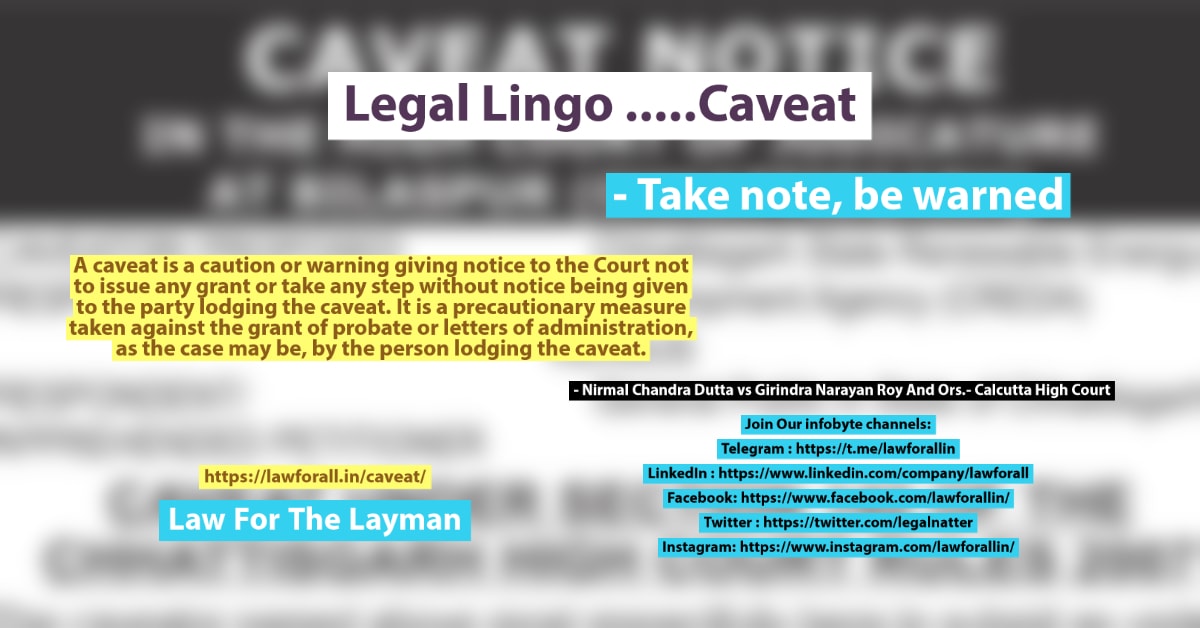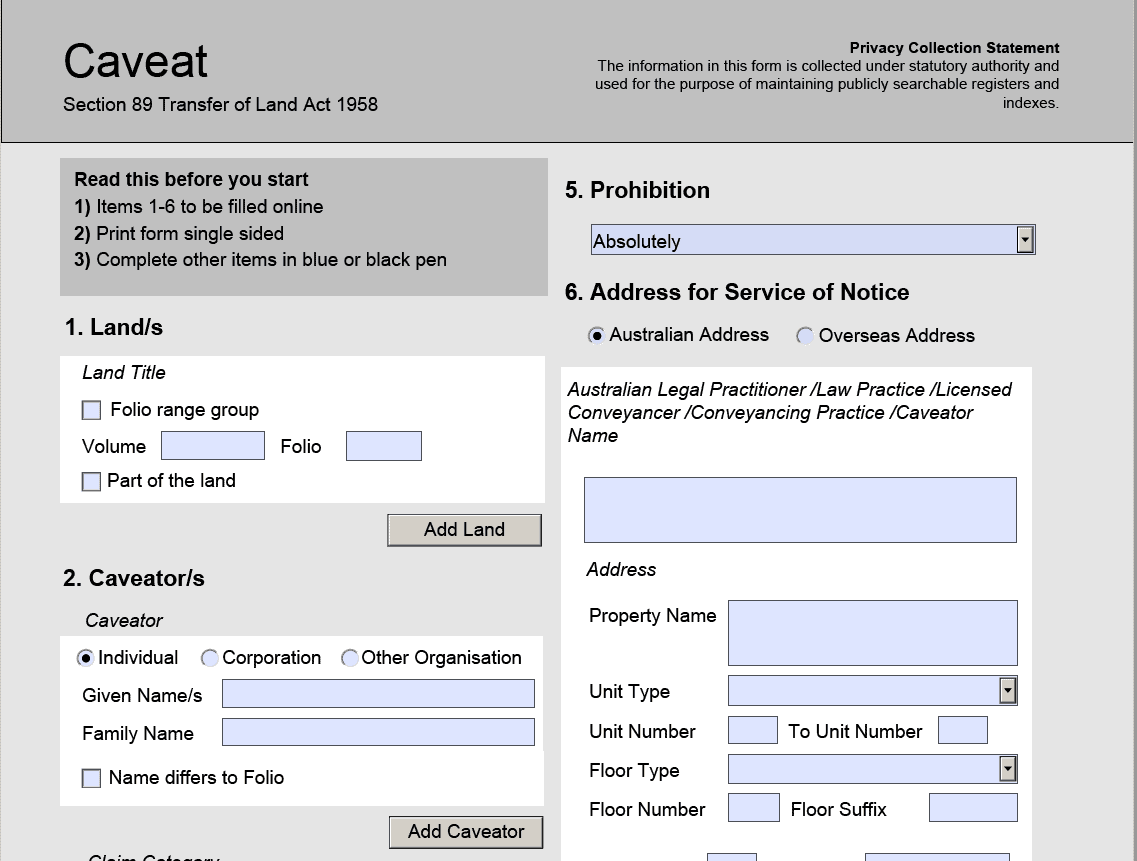
What Is a Caveat On a Property and How to Lodge One
Answer: It is a notification or warning to others that a person has an interest in the title. Caveat means "beware", and lodging a caveat on a prospective property warns anyone with a similar claim that someone else has priority. It effectively acts as a "freeze" on the property, prevents anyone else from dealing with that property, and.

How to Remove a Caveat in Victoria TNS Lawyers
In general terms, a caveat is a notice that is lodged against the certificate of title for someone else's land. The person who registers a caveat is known as the "caveator". A caveat serves as a notice that the caveator claims an interest in the land subject to the caveat, even though the caveator may not be the legal owner of the land.
Removal of a caveat your comprehensive property guide
Caveat emptor is a Latin phrase that translates to "let the buyer beware.". In real estate, it's similar to the idea of buying a house that's sold as is. Caveat emptor means the buyer gets what they get, even if it has major flaws. If unknown problems turn up after the sale, the seller is not responsible for them, leaving the buyer on.

Caveats on Property in Australia Explained
A property caveat is a legal document that provides notice that a person or entity has an interest in a particular property. It operates as a warning or caution to others, particularly potential purchasers or lenders, that someone claims a right or interest in that property. This can include interest through an agreement for sale, a mortgage.

What is Caveat Emptor or Buyer Beware?
Trust Caveat . a. Trust Caveat is a caveat entered in respect of a trust property to protect the property/land or interest which is expressed to be held by any person or body as trustee or the settlor of the property/land or interest. b. Trust Caveat prevents the registration of dealings over the trust property/land. c.

What is a caveat? Do I need one? Wealthsource Legal
Key Takeaways. A caveat serves as a warning registered on a land title that a third party (the caveator) has a caveatable interest in the land. Each state and territory in Australia has different laws relating to lodging caveats on property. Before lodging a caveat, it is important to ensure you have a caveatable interest on the land.

What is a Caveat on a Property? Understanding Property Caveats
A caveat is a legal notice made to the Registrar of Titles. It records a person's interest in a property that is not otherwise reflected in the title of the land. In other words, the 'caveator.

Caveats 101 What does lodging a caveat mean? BAL Lawyers
The caveat prevents the purchaser from becoming the outright owner of the property until they have received confirmation that no third party has any interest in the land or until 28 days from the date of the contract unless the seller and purchaser can agree on an alternative date. If the seller or purchaser does not already have a caveat in.

What is a Caveat ? Law for All
A caveat is a legal restraint, formally known as a 'statutory injunction' to maintain the status of a property until the person's interest in the property has been determined. That may be determined by agreement between interested parties, or by a Court. A caveat is registered on the title of the property and will show up on a title search.

Lodging A Caveat Over Property in Queensland Brisbane's Best Law Firm Aitken Whyte Lawyers
A caveat is a form of registration which is registered on the Certificate of Title to a property for the purposes of notifying the world at large of an interest in that property. Caveats can be.

What Is A Caveat? Guide to Lodgement, Removal & Disputes (Victoria)
A caveat it has been said must be 'supported' by an interest valid in law and that interest is often said as well, required to be a proprietary interest in a property. That is, the interest gives some ownership in the property rather than just an interest as a 'bystander' to the property.

URA Caveat Why caveat lodgings matter 99.co
The word caveat is Latin and translates to "let him or her beware". A caveat can be lodged against someone's property title to protect the lodging party's right or interest in the property and it prevents the registered owner of the property from selling, mortgaging, and dealing with the property until the caveat is removed from the title.

Here Are The Differences Between The 2 Caveat Types In Malaysia!
Among these claims are "caveats" and "liens", terms that may sound intimidating but are crucial in the world of property law. In simple terms, a caveat is like a sign put up on a property saying, "Wait! Someone has a special interest here," while a lien is more like a marker that says, "This property is collateral for money owed.".

Caveat On Property NSW What Is It & How Does It Work? Owen Hodge Lawyers
Caveats. The statutory provisions summarized below authorize the filing of a caveat or other instrument having the same effect as a caveat. For further information about caveats, see Part 19 of the Land Title Act. Submissions. The director has approved the use of the electronic Form 17 Charge, Notation or Filing.

Do you find yourself wondering “What is a Caveat on Property?” YouTube
What is a caveat on property? A caveat on property serves as a formal notice indicating that a third party claims an interest or right over the land or property. The caveat acts as a legal safeguard, effectively warning potential purchasers, mortgagees, or others interested in the property that the land is subject to another party's claim.

What is a Caveat? Your Local Blue Mountains' Solicitors
Caveat is a Latin term that means "let him beware." There are many types of caveats in law and finance, with the most common being "caveat emptor," meaning "let the buyer beware," and "caveat.
- Ea Sports Ufc 3 Ps4
- Would U Love Me The Same
- Words To Coming Round The Mountain
- The Hate You Give Novel
- National Dental Care Brisbane Post Office Square
- 21 Wendy Way Sunshine West
- 100 Years Of Anzac 1 Coin 2014
- Guitarist In Red Hot Chili Peppers
- What Is The Time In Tucson Arizona
- Player Unknown Battlegrounds Server Maintenance
